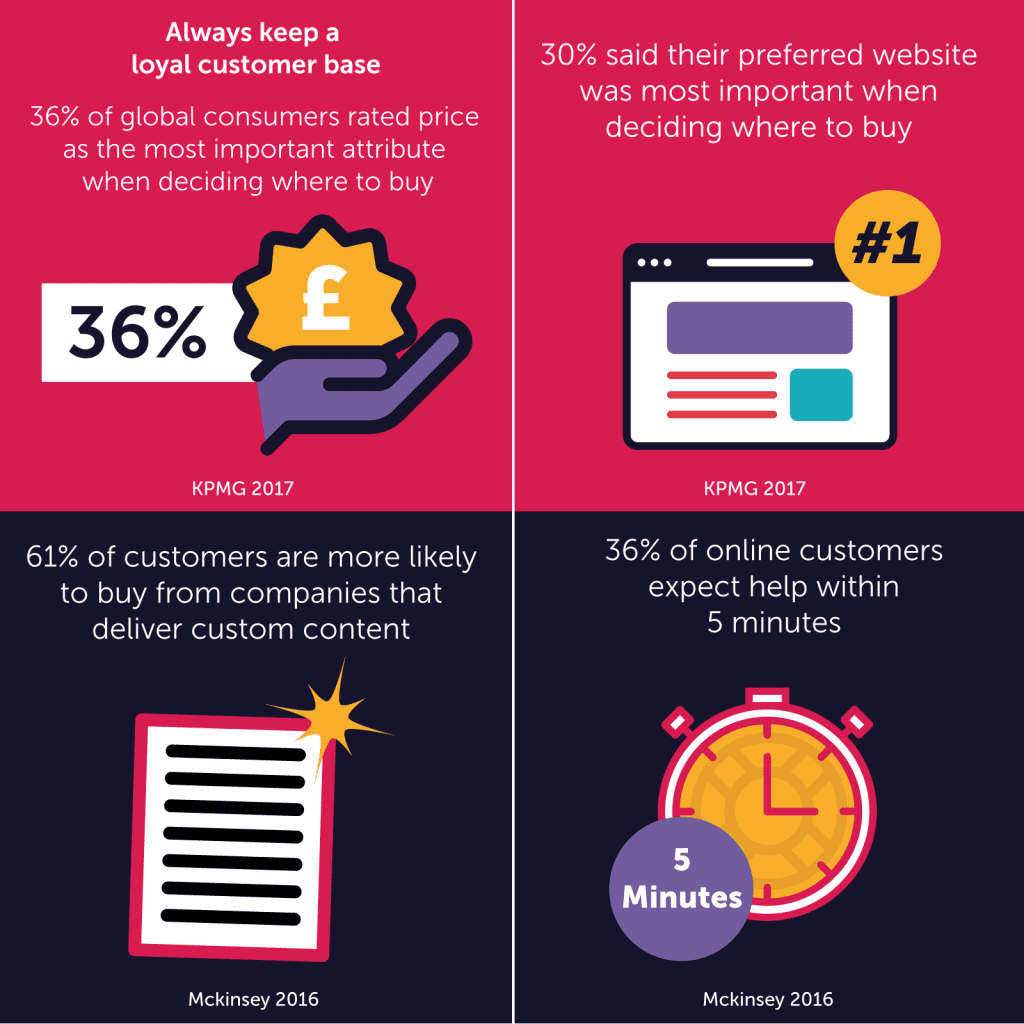4 customer loyalty statistics you need to know [INFOGRAPHIC]

When it comes to business and making more money it’s easy to get wrapped up in flashy marketing tactics and chasing the big sale.
While it can be fun to have the biggest billboard in your town showing your logo, and it’s a big rush to sign up the biggest client of your life – there is another factor that is arguably more important when it comes to making money.
That factor is customer loyalty.
Here are 4 customer loyalty statistics you need to know.
36% of customers rated price as the most important thing when deciding where to buy
This stat from a survey by consultancy firm KPMG shows that even in this day and age of social media, engagement, and a focus on customer experience – for lots of people it still comes down to good old fashioned pounds and pence.
Don’t take this stat the wrong way though – price doesn’t necessarily mean the lowest price.
The right price for your customer can vary wildly depending on your brand positioning.
If you’re a luxury brand that BOGOF offer could actually drive away customers.
61% of customers are more likely to buy from companies that deliver custom content
This stat from Mckinsey is in stark contrast to the previous one.
While the last one shows that some things never change, this stat shows the effect that social media and content marketing is starting to have on people’s buying behaviours.
If you’re a small business owner, entrepreneur or a one man band, you might think you simply don’t have the bandwith to produce your own content and compete with the big boys – but don’t give up yet.
You don’t have to be a content factory to compete in the content marketing game. Simply having one or two strong assets like eBooks and infographics that you can pin to the top of your social accounts will show people you are adding to the conversation and you’re worth taking seriously.
And if you really don’t have the time you can always outsource content creation to sites like people per hour and fivver.
30% of customers said their preferred website was most important when deciding where to buy.
You probably already have a website – you might even think it’s pretty good, but this stat shows just how important it is to get your website right, especially if you’re an eCommerce business.
Don’t take it the wrong way though, you don’t have to invest thousands of pounds with a creative agency to have the flashiest site with tons of java script animation.
Just focus on have a good user journey, making your site as easy to use as possible, and making sure your site works well on all devices.
People would much rather go to a standard looking site that’s super easy to use, than a site that looks like a turner prize entry where you can’t even find the home button.
36% of customers expect help within 5 minutes.
Getting a customer to your site or to your shop costs money.
Whether you’ve physically paid for the click that got them there, or you’ve paid in time and effort to raise awareness of your brands, you need to make the most of every potential customer to maximise your return on investment.
That’s why it’s so frustrating when you lose a customer because they can’t find the information they need to make a purchase.
While you might think your website has everything covered, there’s always going to be some people who can’t find what they need.
As this stat shows, if you’re not able to respond to them quickly you could lose them forever.
Fortunately tools like live chat and social media are making it easier than ever before to talk to your customers whenever they have an enquiry, so you can keep on growing your base of loyal fan base.
Why is Customer Loyalty Important?
Customer loyalty is important for businesses due to its cost-saving benefits, including reduced acquisition expenses through repeat business.
Loyal customers contribute to a positive brand image, attracting new clientele through recommendations and reviews. They tend to spend more and are less sensitive to price fluctuations, increasing revenue and profitability.
In addition to this, loyal customers offer valuable insights for product/service enhancements, improving innovation and market competitiveness.
Follow us
Did you enjoy this article? Make sure to follow us on social media for more just like this.